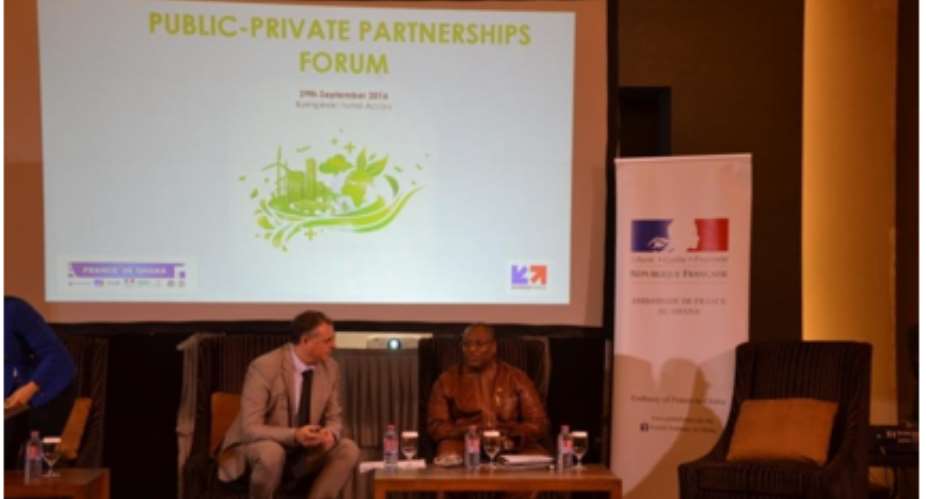On the 29th of September at the Kempinski Hotel, Gold Coast City Accra, Hon. Alex Segbefia, Minister of Health and the Ambassador of France to Ghana, HE François Pujolas officially launched the first day of a two day forum on Public/ Private Partnerships and Sustainable cities organised by the Embassy of France to Ghana and its partners.
The first day, organized by the Embassy, in partnership with Business France and the French Chamber of Commerce in Ghana, was dedicated to Public/Private Partnerships focusing on 4 key sectors for Ghana’s economy. For each sector, a French company presented a project it successfully completed in a country similar to Ghana.
At this occasion, the Ambassador of France to Ghana recalled that today, in most of the countries, public budget alone cannot finance upgrading and building of infrastructures in an efficient and environment friendly way and new solutions have to be found to cope with it. “An obvious one is Public Private Partnerships”.
He stated that many French companies developed, through PPP, innovative technologies in the field of renewable energy and sustainable development, adding that they are ready to share this expertise in Ghana so the country can create a responsible development in such sectors as energy, water, transport and health management.
PPP and sustainable development: a key issue for bilateral cooperation between France and Ghana
The Ambassador also mentioned the visit of President Mahama in France earlier this week where he met with French President François Hollande. Indeed, the French Head of State welcomed the development of economic relations between France and Ghana, namely in the energy, urban planning, agri-business, telecommunications and transport sectors.
Ghana is the second biggest economy of the ECOWAS zone after Nigeria. The country attained the category of “Lower Middle Income countries” in 2010 and has better development indicators than most of Sub-Saharan economies. However infrastructural needs remain very crucial: transport, roads, water and sanitation, health, administrative organisation, and most especially electricity supply. Since French companies have recorded worldwide success in these sectors, particularly through public/private partnerships, these serve as good examples to meet Ghana’s current needs.
The second day, the Embassy, in partnership with Institut Français and ArchiAfrika, organized a presentation of the Ghanaian and French approaches to sustainable cities in order to have a better understanding of the French approach and an illustration of these PPP examples. In his opening remarks of the second day, the Ambassador reiterated that the forum would enable companies operating in the PPP’s show their expertise which is currently not sufficiently known in Ghana while conveying the image of a modern, creative and evolutionary French offer in direct drive with the evolution of the African continent in general and Ghana in particular.
Exchanging “best practices” between France and Ghana: concrete approach to sustainable urban development
The Ambassador recalled that the “problem of the sustainable city in western Africa and particularly in Ghana is indeed becoming a major issue for the social, economic and environmental development of a great majority of the population”. Indeed, since 2010, the Ghanaian population in urban areas is 51.5%, and it will double by 2030. He stated that the “stakes of planning and urban development are therefore very high”. ‘The “sustainable city approach” will allow decision-makers and urban actors to think and act differently, with new practices and techniques designed for a new urban model with effective solutions for critical issues such as housing problems, urban ecology, transports, human and social development.
The second day of the forum was inaugurated with Honorable Mahama Ayariga, Minister of Environment, Science, Technology and Innovation. The session targeted architects, policy makers and other creative involved in urban development addressing the theme “realities and perspectives of sustainable cities in Ghana”. Round tables were organized and the presentation of a digital demonstrator designed from A to Z by more than 100 French companies; showing the unique and original global approach that puts together private companies as well as public decisions makers, to design an entire city.





 SSNIT must be managed without gov’t interference – Austin Gamey
SSNIT must be managed without gov’t interference – Austin Gamey
 Ejisu by-election could go either way between NPP and independent candidate — Gl...
Ejisu by-election could go either way between NPP and independent candidate — Gl...
 We never asked ministers, DCEs to bring NPP apparatchiks for returning officer r...
We never asked ministers, DCEs to bring NPP apparatchiks for returning officer r...
 No one denigrated the commission when you appointed NDC sympathizers during your...
No one denigrated the commission when you appointed NDC sympathizers during your...
 Used cloth dealers protests over delayed Kumasi Central Market project
Used cloth dealers protests over delayed Kumasi Central Market project
 A/R: Kwadaso onion market traders refuse to relocate to new site
A/R: Kwadaso onion market traders refuse to relocate to new site
 Dumsor: Corn mill operators at Kaneshie market face financial crisis
Dumsor: Corn mill operators at Kaneshie market face financial crisis
 Jamestown fishermen seek support over destruction of canoes by Tuesday's heavy d...
Jamestown fishermen seek support over destruction of canoes by Tuesday's heavy d...
 Election 2024: EC to commence voter registration exercise on May 7
Election 2024: EC to commence voter registration exercise on May 7
 Public schools rebranding: We’re switching to blue and white, we’re painting all...
Public schools rebranding: We’re switching to blue and white, we’re painting all...
